Inside the criminal underworld of hair trafficking with the new crime comic Snatched
Newsarama explores the secretive and sometimes criminal underworld of hair extensions, hair weaves, and wigs

You probably see it every day, but don't notice. And if you do, you presume it's not what it could be.
Makers of hair extensions, wigs, and weaves that use human hair have to obtain that it from somewhere - which turns out to be a real underground market for human hair. And of course, that leads to questions as to not only who are the buyers and sellers, but where the sellers got it from in the first place and did the sources give it away willingly?
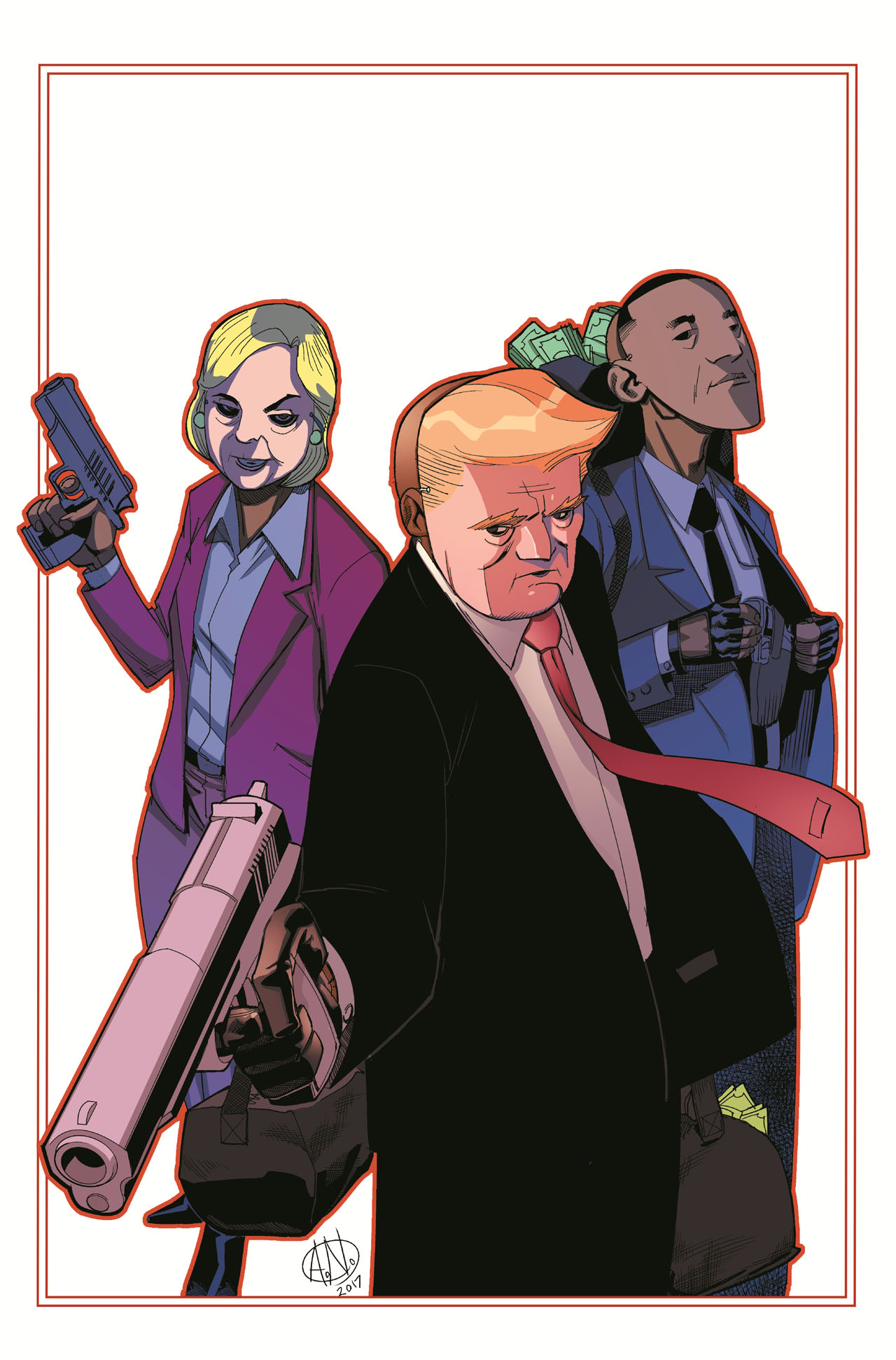
In the upcoming crime comic Snatched, writer Sheldon Allen and artist Mauricio Campetella are delving into the seedy side of human hair trafficking. While their characters and narrative are fiction, it's based on an underground market as real as drug trafficking - but where all of the 'product' is actually part of a real, living person like you or I.
With Snatched #1 going on sale on April 28, we spoke with Sheldon Allen about this underworld world of hair trafficking, how he came to know of it, understand it, and find room for a fictional story.
Newsarama: Sheldon, Snatched hits on a very sad, but very true crime story - that of human hair trafficking. How'd you come to know about this side of the hair industry?
Sheldon Allen: If you've ever dated a woman down here in Miami, then you know the outsized importance a woman's hair plays in their life. It's not much different in other cities, but it is a pretty big deal down here. Like entire schedules revolve around the issue. Some women will legit not venture outside of the house until their hair has been installed.
Over the years I can't tell you how many hours I've spent in the hair store, dragging along behind a girlfriend while they picked up their products and preferred brand of hair. Like a kid in the grocery store trailing their mom, these hair stores and salons were the last places I wanted to be, but like most writers forced into an unfamiliar situation, the more time I spent there the more the ideas and questions started to percolate. The hair store soon became an interest to me.
Comic deals, prizes and latest news
Get the best comic news, insights, opinions, analysis and more!
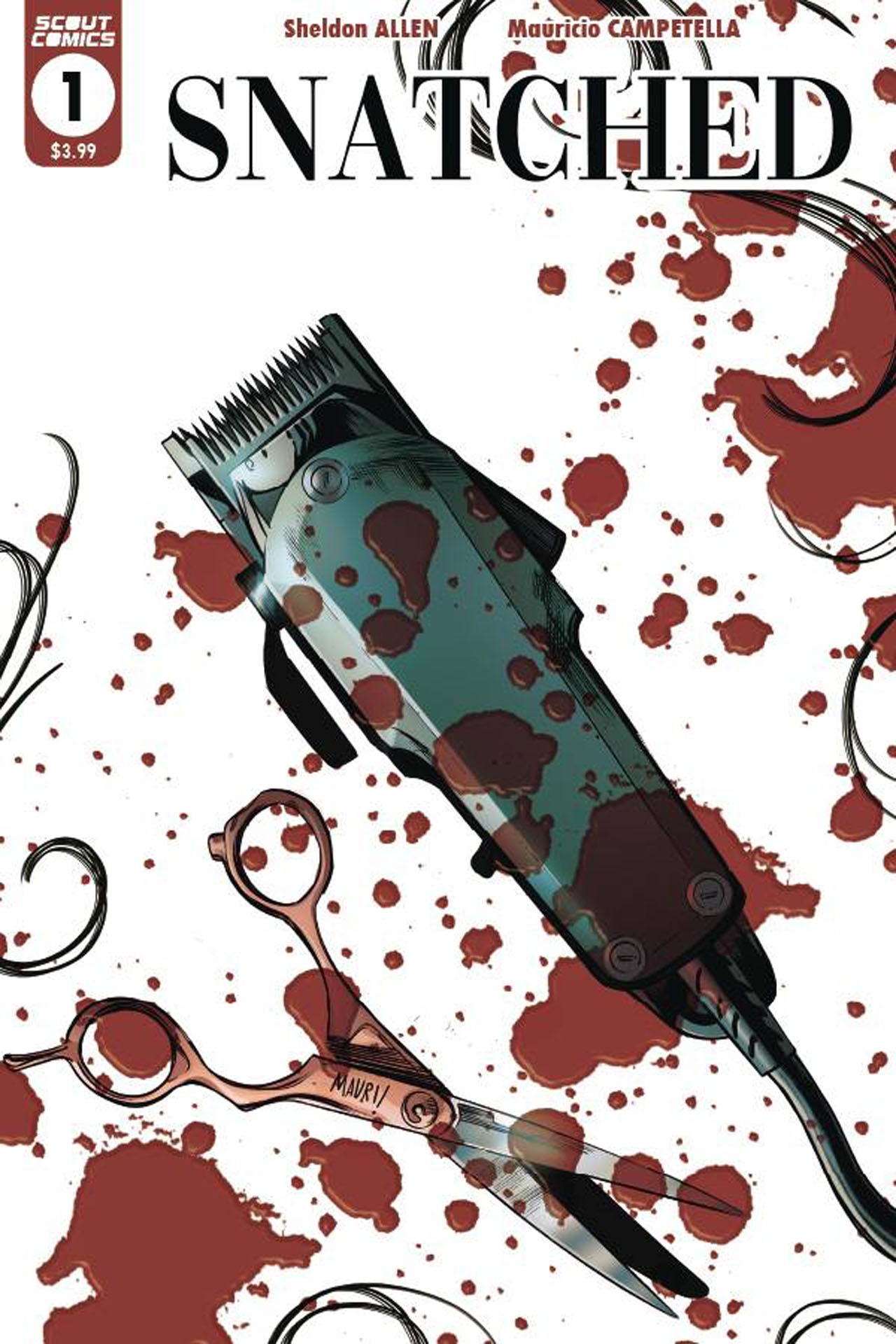
Just where the hell does all of this stuff come from anyway? And why is it so expensive? Jesus Christ is it expensive. It was not out of the ordinary to see someone drop over a thousand dollars at these spots, and they'd do so quite enthusiastically. For. Hair. And there was so much of it too.
And what's up with ALL of the primary agents, controllers, operators, and owners involved with these stores being men? Surely that's by design. There has to be some kind of underworld trade behind this industry, I thought, and if there isn't, I'm going to create a story where there is because that would be an awesome tale and one hell of a hook.
As I started to write and research what would become the story of Snatched, I began stumbling across articles detailing exactly what I was writing about. Hair trafficking was a reality, which begged the question and an even scarier follow-up: Why is this something we don't hear about more, and even if we did know about it, would it change anyone's behavior or buying habits?
Nrama: So you found the inspiration of a story there - why comics?
Allen: Snatched initially was conceived out of boredom and searching for a way to entertain myself while standing around various hair stores over the years.
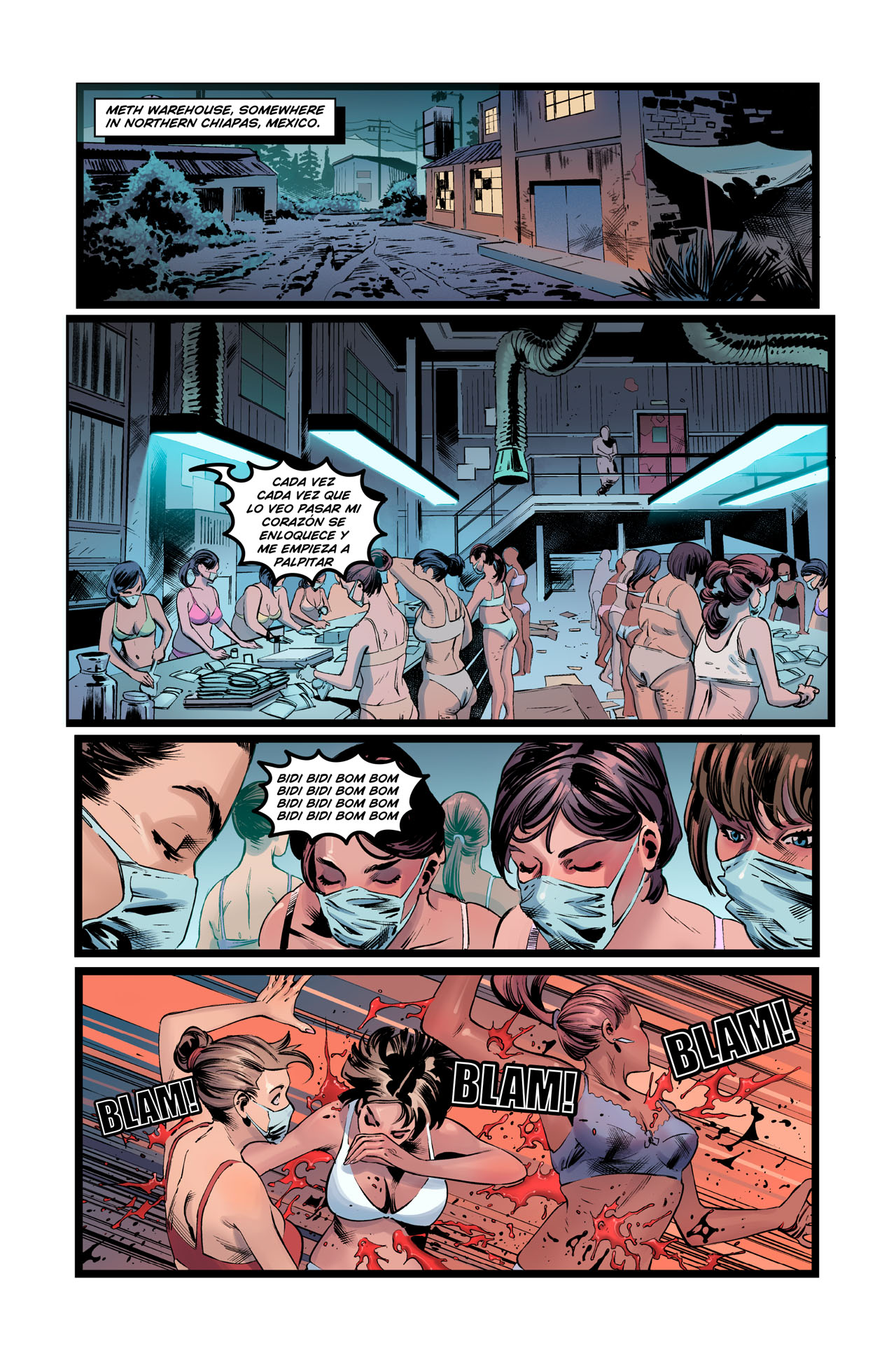
This will be my third creator-owned book with Scout, and the one constant in all of the series I have done so far is that they don't fit the standard mold of what a comic book is. You could maybe make that argument for Concrete Jungle, but even with that one, the storytelling and characters definitely weren't traditional.
With Snatched, I wanted to do an exotic crime book about a subject I've come to have extensive experience with. I enjoy being able to tell readers with a straight face and without even the slightest hint of hyperbole that there isn't another book like this on the stands. I love this medium and I'm trying to do everything that I can to diversify the stories being told.
Nrama: So what is your story, Snatched?
Allen: Snatched is the story of the American Dream by any means necessary.
We all love and champion the idea of upward mobility and elevation of status, but we very rarely stop and think about the consequences, collateral damage, and exploitation involved with materializing those goals. Who is being left behind? Is your benefit coming at someone else's expense? How much of yourself are you willing to sacrifice in order to grasp this concept of success we've been sold?
It's also about the normalized and accepted levels of misogyny that permeate from the many businesses we give our money to without second thought. It still is insane to me that this industry, which cannot exist without women, physically or financially, is wholly dominated and controlled by men.

Nrama: Who are the primary characters in this?
Allen: There are three primary stories intertwined in this first volume.
The first character we're introduced to is Andre. He's an ex-felon working as a strip club manager, a job he absolutely loathes. When he hears about a possible play involving trafficked hair, he sees it as his opportunity to become the businessman he's always envisioned himself as.
Next, we meet up with Mo, the milquetoast owner of an L.A. hair store. He's done things the right way his entire life, but his new bride and her father are showing him a side of humanity he'd rather have nothing to do with but may have no choice to adapt to if he is to survive.
The third thread we're brought into involves Mr. Lee, the owner-operator of one of the country's largest Human Hair companies, whose entire business operation becomes threatened when past and current secrets begin surfacing.
Nrama: Have you spoken to any victims of human hair trafficking?
Allen: The crazy, depressing thing about human trafficking we all should constantly remind ourselves of is that it happens in plain sight. There's a very good chance every person reading this has spoken to a victim of human trafficking and not even known it.
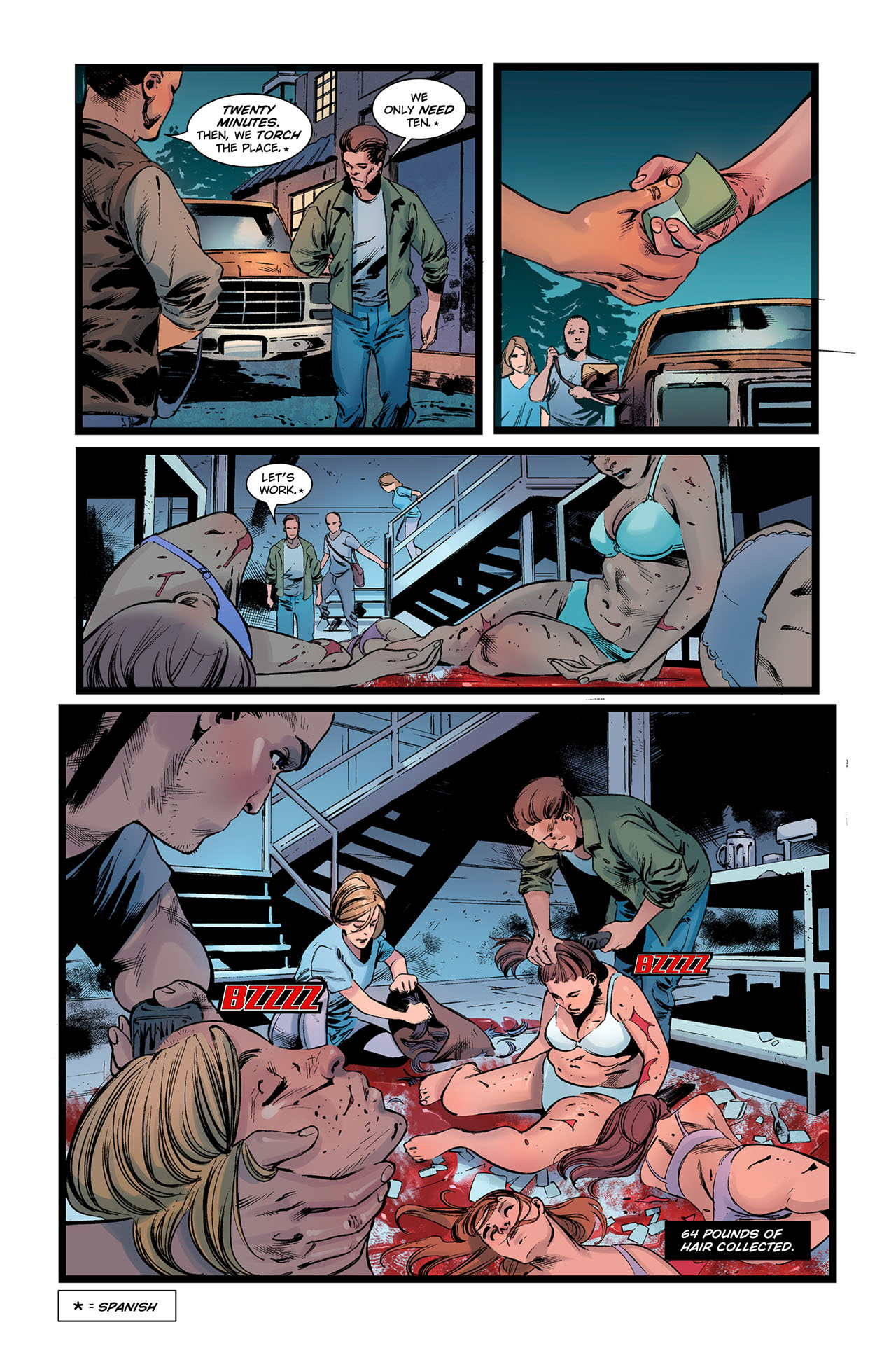
Although not specifically for this project, I've come in contact with and had extensive conversations with victims of trafficking given the nature of my profession, and the one constant I've noticed with most of these victims -- and let's be clear, they are victims -- is there's a piece of the human element that seems to be missing. Almost like they were robbed or drained of it. This is especially evident with the victims I knew before they were treated as human chattel.
It doesn't matter how much they smile, laugh, or cry, there's like a small emptiness inside, and understandably so -- I imagine being trafficked and traded isn't something one gets over easily, if ever.
Nrama: What do you hope to do with Snatched - besides, of course, selling copies of the comic?
Allen: Real talk, although this is a very real issue, my primary aim with Snatched is entertaining the readers. The book isn't preachy or heavy or anything like that. I'm just trying to tell an engaging story and hopefully attract some new, non-traditional readers to the medium. I feel like Snatched is a book you can give to people who've never read a comic or walked into a comic book store in their life.
Nrama: You're working on this with Mauricio Campetella. What made him the right fit for this story?
Allen: Man, Mauricio is my guy. He took this script and dove headfirst into it, and I give him all the credit in the world because coming from Argentina, it's not a world or subject matter he had much experience or knowledge about when he first read it, and yet, you'd think he was right there in those hair stores with me. He knows what I want with the art without me having to ask, and that's the kind of collaboration a writer might search for years without ever finding.
We have another book already finished in the pipeline, so that should tell you how much confidence I have in him as a penciler, because I'm pretty picky, but I'd be perfectly fine having Mauricio draw every book I write from now on. I also have to give a deserved shout-out to my color person Warnia, and my letterer Matt Bowers. They are the squad for real.
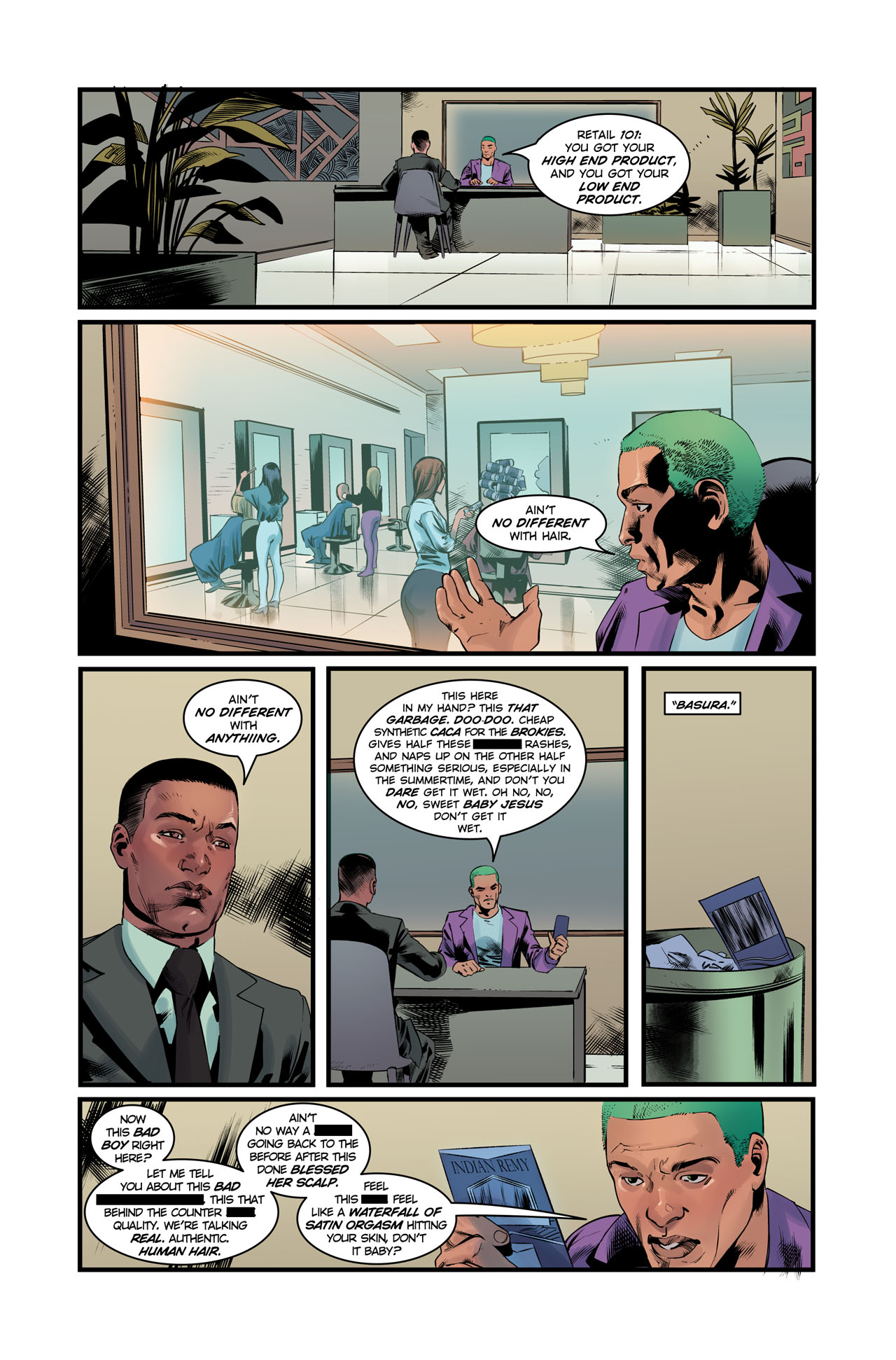
Nrama: Last question, what would you say to people looking at this comic not just as a story but also to understand the human hair trafficking industry?
Allen: It's important to make sure I'm not selling Snatched as some pretentious expose on the human hair trafficking trade. That's just one element of a larger story which is ultimately about the characters of Andre, Mo, and Mr.Lee and their respective journeys.
But this is a thing that's happening right now, probably in your community, right in front of you, I don't want to sound like I'm on a soapbox preaching or politicking, because at the end of the day I want my books to be fun and entertaining, and that is my approach, but it is interesting to ponder about how the bundle of 24-inch shiny hair flowing down the shoulders of your favorite Instagram model follow was forcefully removed from someone's scalp thousands of miles away before it reached its final destination.
And on that somber note, I hope folks give Snatched a chance. Trust me, it's a heavy subject, but the book is anything but. It's funny, suspenseful, and an unpredictable wild ride from start to finish.
Snatched #1 (of 4) goes on sale on April 28 in participating comic shops and on most digital platforms. For the best digital comics experience, consult our list of the best digital comics readers for Android and iOS devices.
Chris Arrant covered comic book news for Newsarama from 2003 to 2022 (and as editor/senior editor from 2015 to 2022) and has also written for USA Today, Life, Entertainment Weekly, Publisher's Weekly, Marvel Entertainment, TOKYOPOP, AdHouse Books, Cartoon Brew, Bleeding Cool, Comic Shop News, and CBR. He is the author of the book Modern: Masters Cliff Chiang, co-authored Art of Spider-Man Classic, and contributed to Dark Horse/Bedside Press' anthology Pros and (Comic) Cons. He has acted as a judge for the Will Eisner Comic Industry Awards, the Harvey Awards, and the Stan Lee Awards. Chris is a member of the American Library Association's Graphic Novel & Comics Round Table. (He/him)



